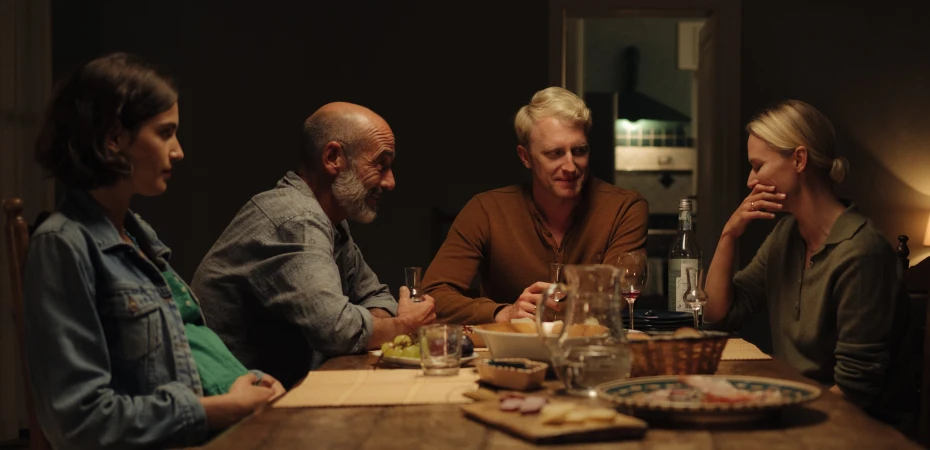How people dance always gives them away. Alone on the floor of a Sardinian coastal nitespot in Silent Land, the bourgeois Polish couple Adam (Dobromir Dymecki) and Anna (Agnieska Żulewska) fling themselves around as dementedly as if red ants are swarming on their bodies.
Their manic grins are unnatural. When Anna is dragged into the locals’ folk dance in the town square, the unease that grips the pair in the film’s second half emerges on her face.
Tall and Nordic-looking, projecting superiority and self-entitlement, Adam and Anna had earlier been questioned about the accidental drowning in their vacation villa pool of the immigrant worker (Ibrahim Keshk) sent to fix it by their eager-to-please landlord (Marcelo Romolo). Until they realised they were under suspicion, the man's death bothered them only marginally more than the sight of the empty pool that greeted them on arrival.
Beyond reasonable doubt, Adam and Anna froze when they might have rushed to the worker’s rescue and administered CPR. But the chief of police grudgingly exonerates them lest the incident impact tourism in a resort area already compromised by the presence of NATO troops (as if the water shortage amid the vastness of the Med wasn't bad enough).
 Hence “silent” in the title of Aga Woszczyńska’s potent directorial debut, which she co-wrote with Piotr Litwa. Prompted by the 2013 shipwreck off the southernmost Italian island Lampedusa, which caused the deaths of an estimated 366 migrants travelling from Libya, the film is a caustic allegory of Western indifference in the face of the global humanitarian catastrophe.
Hence “silent” in the title of Aga Woszczyńska’s potent directorial debut, which she co-wrote with Piotr Litwa. Prompted by the 2013 shipwreck off the southernmost Italian island Lampedusa, which caused the deaths of an estimated 366 migrants travelling from Libya, the film is a caustic allegory of Western indifference in the face of the global humanitarian catastrophe.
Underscoring the capitalistic callousness is the greed of the scuba diving instructor Arnaud (The Big Blue’s Jean-Marc Barr), who risks the lives of his clients, including the skittish Adam. Befriended by Arnaud and his wife Claire (Alma Jodorowsky), Adam and Anna are not so obtuse they don’t recognise Claire is unhappy and hankers for her native France. (Pictured above: Jodorowsky, Barr, Dymecki, Żulewska)
Claire's resentment of her husband’s unscrupulousness means that one of the foursome has a vestige of integrity – the baby she’s carrying hints at a future life for morality. Conscience meanwhile cracks Adam’s Aryan alpha carapace. He crumbles under the burden of guilt, to the extent that he does a dummy run for suicide.
Moments before, the self-preserving coward Anna mocked him as a weakling. As Woszczyńska has stated, however, Adam is stronger than Anna for his inklings of fellow feeling, even if they dawn on him after the fact of the worker's death. It's implicit that his culpability is ours.
For much of its running time, Silent Land is as stark and affectless as Michael Haneke’s Caché (2005) and Happy End (2017), analogous films in their analysis of colonialism and xenophobia.
In permitting glimpses of Adam’s unconsciousness through fragments of his dreams and a concluding vision of how he is likely to perceive his future with Anna, Woszczyńska adds an emotional layer to the movie that the austere Haneke would find sentimental. When guilt is experienced at the deepest level, this gifted new filmmaker suggests, change might be possible. The capitalist psyche, though, is scarcely mutable.















Add comment